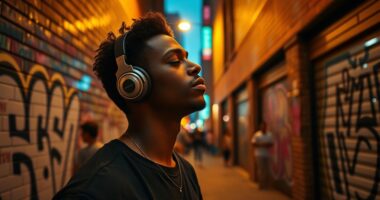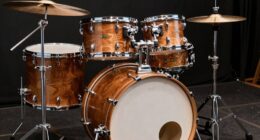AI composes film scores in real time by analyzing visual cues, dialogue, and scene mood to generate adaptive soundtracks. It uses neural networks and machine learning to create immersive, emotionally resonant music that matches the mood shifts seamlessly. This technology can improvise melodies and adjust compositions instantly, making scoring more efficient and dynamic. If you want to learn how these groundbreaking techniques are shaping the future of film music, keep exploring the details.
Key Takeaways
- AI analyzes visual cues and dialogue to assess scene mood and emotional tone in real time.
- Neural networks generate immersive soundscapes by learning patterns from large musical datasets.
- Adaptive composition techniques allow AI to modify music instantly based on scene changes or viewer reactions.
- Continuous feedback loops refine the score, ensuring synchronization with evolving visuals and narrative shifts.
- AI analytics optimize emotional impact and timing, enabling seamless, real-time integration of music with film scenes.
The Evolution of Film Scoring and AI’s Role
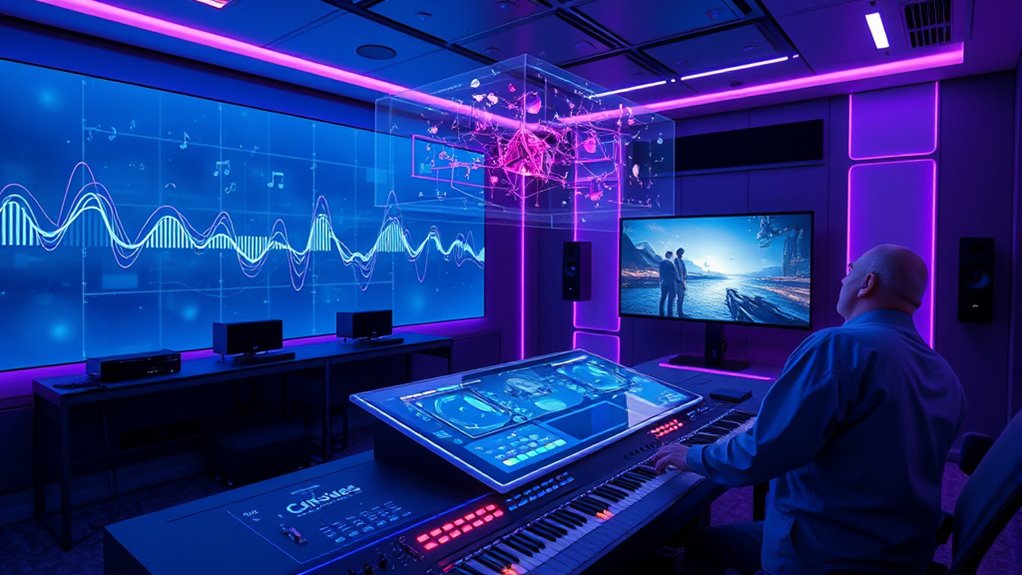
Since the dawn of cinema, film scoring has evolved from live orchestras and manual composition to sophisticated digital production, reflecting advances in technology and artistic innovation. Today, AI plays a significant role in this evolution by enhancing emotional authenticity in soundtracks. It enables composers to craft music that resonates deeply with diverse audiences, embracing cultural diversity. AI-driven tools analyze vast musical styles, allowing scores to authentically reflect different cultural nuances and emotional tones. This progress makes film music more inclusive and expressive, breaking down traditional barriers. As a result, you can experience richer, more genuine soundscapes that elevate storytelling. The integration of AI in film scoring not only preserves artistic integrity but also broadens the scope for cultural representation and emotional depth. Additionally, high-quality soundtracks can be generated more efficiently, reducing production costs and timeframes.
How Real-Time AI Composition Works
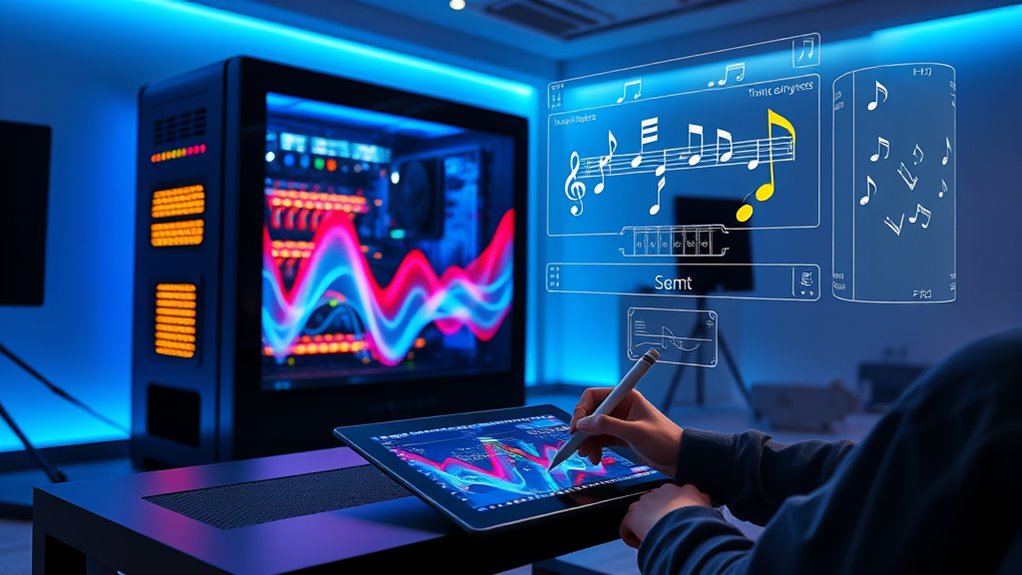
Real-time AI composition transforms film scoring by generating music on the spot based on live inputs and scene dynamics. You experience this through a process rooted in algorithmic improvisation, where AI adapts its output instantly. Key steps include:
- Scene analysis: The AI assesses visual and dialogue cues to understand mood.
- Neural soundscapes creation: It crafts immersive sound environments tailored to the scene.
- Music generation: Using learned patterns, the AI improvises melodies that fit the context.
- Feedback loop: Continuous adjustments refine the score as the scene evolves.
This seamless interplay results in dynamic, emotionally resonant scores, showcasing how neural soundscapes and algorithmic improvisation work together to produce compelling, real-time music that syncs perfectly with the film’s pace. Additionally, leveraging AI analytics tools helps optimize the scoring process for better synchronization and emotional impact.
Key Technologies Behind AI-Generated Scores
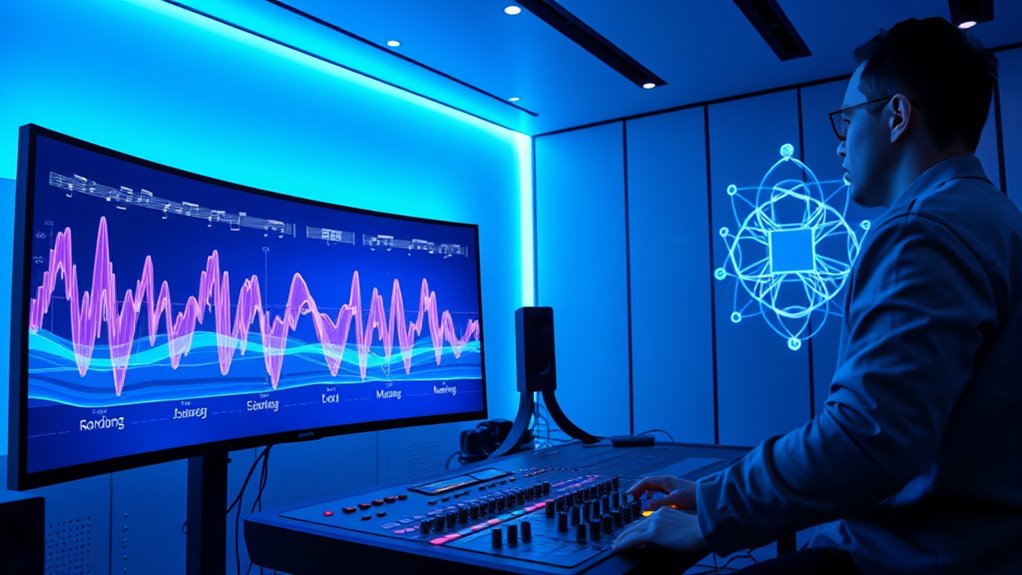
The development of AI-generated film scores relies on a combination of advanced machine learning models and sophisticated audio processing technologies. Neural networks, a core component of machine learning, enable AI systems to analyze vast musical datasets, learn patterns, and generate coherent compositions. These networks can identify subtle nuances in music, such as harmony, rhythm, and mood, allowing the AI to produce contextually appropriate scores. Growing Chia Seeds Machine learning algorithms continually improve as they process more data, enhancing their ability to create emotionally resonant music in real time. Additionally, audio processing technologies refine these outputs, ensuring seamless integration with film scenes. Together, neural networks and machine learning form the backbone of AI’s capability to compose dynamic, tailored film scores efficiently and accurately.
Adaptive Soundtracks and Dynamic Mood Matching
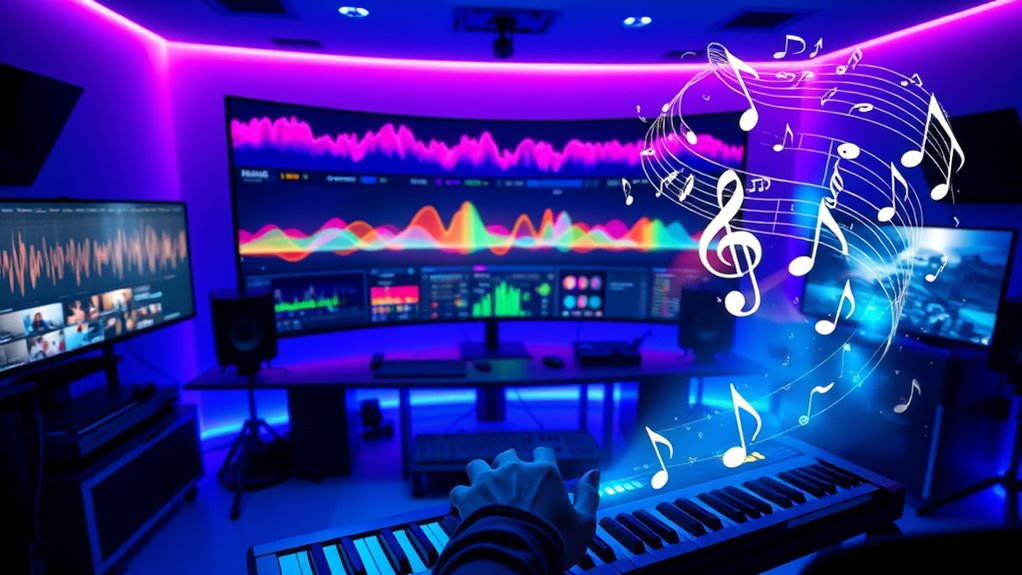
Adaptive soundtracks leverage AI to modify music dynamically, matching the evolving mood of a film scene. This technique enhances emotional resonance by tailoring music to the viewer’s experience. It also facilitates genre blending, creating unique soundscapes that adapt in real time. Here are four key aspects:
- Real-time adjustments that reflect scene intensity and tone.
- Seamless transitions between different musical styles for smooth mood shifts.
- Personalized scoring based on viewer reactions or scene context.
- Enhanced emotional impact through music that evolves with storytelling.
- Integrating vetted music products and techniques ensures safety and quality in the soundtrack composition.
Benefits of Using AI in Film Scoring

Have you ever wondered how AI transforms film scoring? One major benefit is the efficiency it offers. AI can generate music quickly, reducing production time and costs. This streamlines the entire process, allowing filmmakers to experiment with different scores without extensive delays. Additionally, AI helps with music licensing by creating original compositions, eliminating worries about copyright issues. It also boosts audience engagement by producing tailored soundtracks that match scene moods in real time, heightening emotional impact. This adaptability keeps viewers immersed and emotionally connected. Overall, AI enhances flexibility, reduces overhead, and improves the cinematic experience—making film scoring more innovative and accessible for creators. These benefits show how AI is reshaping the future of film music.
Challenges and Limitations of AI-Generated Music

You might find that AI struggles with capturing the full depth of human creativity and emotional nuance. Technical constraints can also limit the complexity and variety of generated music. These challenges remind us that AI still has work to do before it can fully replace human composers.
Creative Limitations
While AI has made significant strides in composing music, it still faces notable creative limitations. You might notice that AI struggles with delivering true musical originality and emotional depth. Here are four key challenges:
- Lack of genuine creativity – AI often relies on patterns, making it hard to produce truly unique compositions.
- Limited emotional nuance – Conveying complex emotions remains difficult for algorithms.
- Predictable melodies – AI-generated music can sound repetitive or formulaic over time.
- Contextual understanding – AI can miss subtle cues from the scene, affecting emotional resonance.
Additionally, the absence of cultural and regional influences can limit AI’s ability to craft authentic-sounding scores that reflect diverse musical traditions.
These limitations mean AI might fall short in crafting scores that feel deeply authentic, challenging its role in creating emotionally compelling film music.
Technical Constraints
Despite rapid advancements, AI-generated music still faces significant technical constraints that limit its effectiveness. Hardware limitations can hinder real-time composition, especially when processing complex musical arrangements quickly. High-performance servers are often necessary, but they aren’t always accessible or affordable, slowing down the creative process. Licensing restrictions also pose challenges; AI systems trained on copyrighted material may struggle with legal compliance, restricting the use of generated music in commercial projects. Additionally, licensing issues can limit access to quality datasets needed for training, reducing the diversity and originality of the compositions. These technical constraints mean that, while AI can produce impressive results, it still requires human oversight, substantial infrastructure, and careful legal navigation to fully realize its potential in film scoring. Incorporating sound development techniques can help optimize AI outputs and enhance their integration into professional projects.
Notable Examples and Case Studies
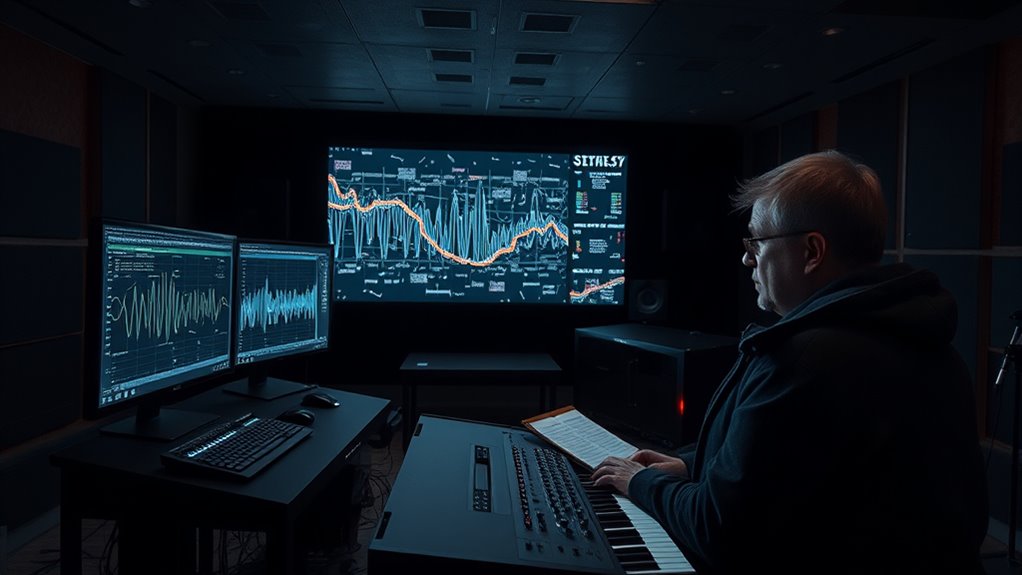
One of the most notable examples of AI in film scoring is the use of OpenAI’s Jukebox to generate music for various movie scenes. This technology showcases AI’s ability to produce diverse soundtracks, from AI generated jazz to full machine learning symphonies. Consider these key cases:
AI-generated film scores showcase diverse styles, from jazz improvisations to full symphonies, revolutionizing cinematic soundtracks.
- AI-generated jazz that creates improvisational scores tailored to specific moods.
- Real-time scoring for experimental films using dynamic AI compositions.
- Adaptive soundtracks that change based on scene intensity, powered by AI algorithms.
- Case studies demonstrating AI’s potential to mimic human composers’ styles, accelerating the scoring process.
- The integration of user consent management practices ensures that data used for AI training respects privacy policies and user preferences.
These examples highlight AI’s creative capabilities, transforming how film scores are conceived and integrated.
Impact on Composers and the Music Industry
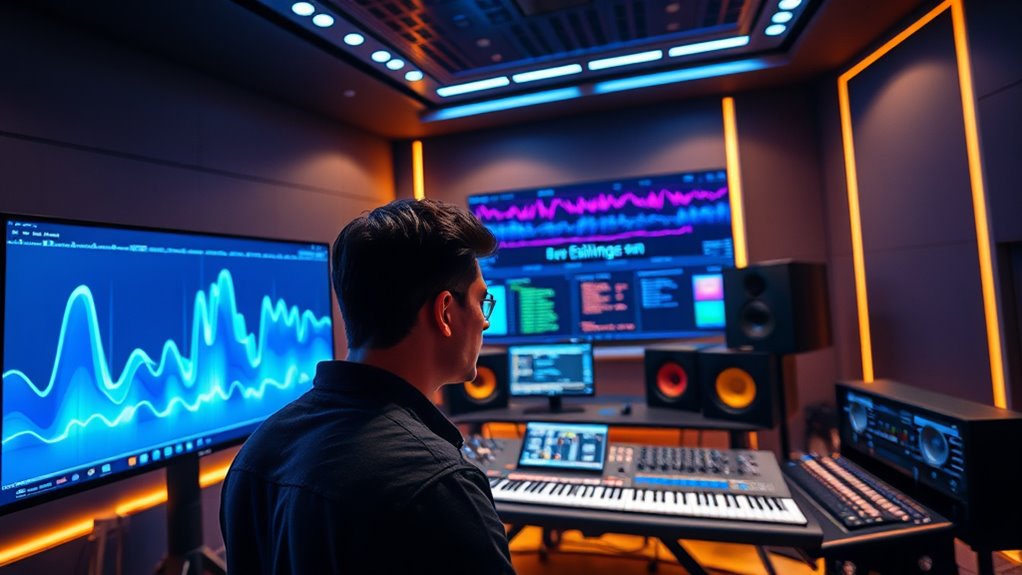
The integration of AI in film scoring is already transforming the roles and opportunities for composers and the broader music industry. You may find AI tools expanding creative possibilities but also raising questions about AI ethics and authenticity. As AI handles more composition tasks, some fear job displacement, yet new roles emerge—like overseeing AI-generated music or managing licensing. This shift emphasizes the need for clear music licensing frameworks to protect artists’ rights. Consider this emotional impact: Newborn Safety Guidelines are crucial in broader contexts of care and responsibility, highlighting the importance of establishing trust and security in new technological landscapes.
Future Trends in AI-Driven Film Music
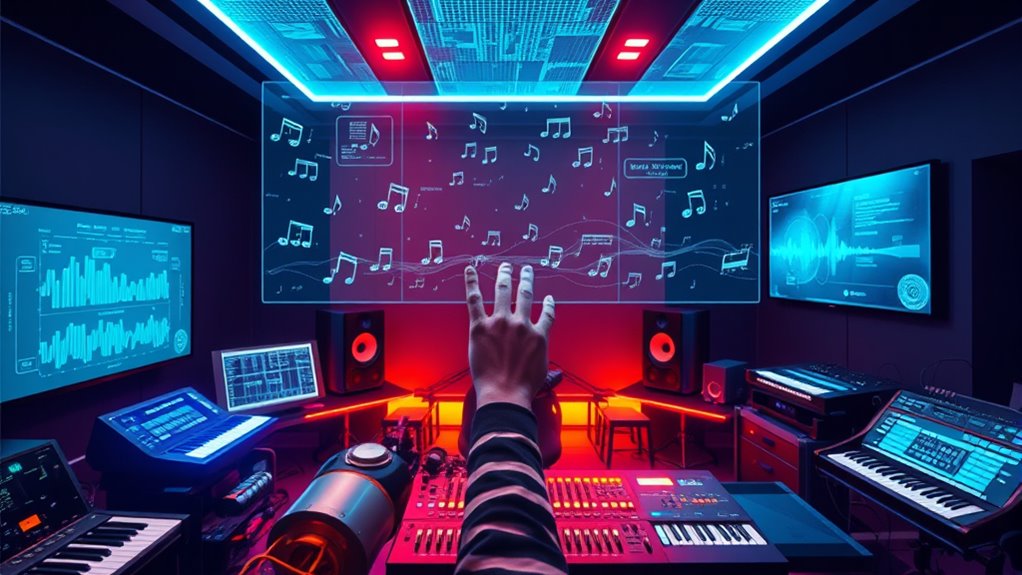
Future advancements in AI-driven film music will likely include more sophisticated adaptive composition techniques that respond in real-time to a scene’s emotions. You’ll also see tighter integration between music and visuals, creating seamless experiences that enhance storytelling. These trends will push the boundaries of how music supports and elevates film narratives. Additionally, as AI continues to evolve, it will increasingly incorporate creative practice principles, enabling more nuanced and emotionally resonant compositions.
Adaptive Composition Techniques
As AI technology advances, adaptive composition techniques are set to revolutionize how film scores respond to dynamic storytelling. You’ll see AI create more personalized, emotionally expressive music that adapts in real time. Here are four key developments:
- Fine-tuned emotional expression aligning with scene intensity
- Seamless genre adaptation matching narrative shifts
- Interactive feedback loops for real-time score adjustments
- Enhanced listener engagement through tailored musical cues
- The ability to detect passive voice ensures clearer, more direct communication in musical instructions.
These innovations enable AI to craft soundtracks that deepen emotional impact and maintain coherence throughout evolving scenes. Instead of static scores, you’ll experience more immersive storytelling where the music dynamically aligns with on-screen action. Adaptive techniques make scores more responsive, creating a fluid, emotionally resonant experience that heightens audience engagement and elevates storytelling.
Integration With Visuals
Advancements in AI are enabling film scores to seamlessly integrate with visual elements, creating a more cohesive storytelling experience. AI systems now focus on visual synchronization and emotional alignment, ensuring music matches scene intensity and mood in real time. This integration allows for dynamic scoring that adapts instantly to visual changes, heightening emotional impact. Here’s how it looks in practice:
| Scene Type | AI Response | Effect |
|---|---|---|
| Action | Rapid beats, loud dynamics | Heightened tension |
| Romantic | Soft melodies, slow tempo | Deep emotional connection |
| Suspense | Dissonant sounds, fluctuating volume | Increased anticipation |
| Joyful moments | Bright melodies, lively rhythms | Uplifting atmosphere |
This synergy deepens viewer engagement through precise visual synchronization and emotional alignment.
Ethical Considerations and Creative Ownership

The rise of AI in film scoring raises important ethical questions about originality and ownership. You might wonder who owns the music—whether it’s the creator of the AI, the filmmaker, or the AI itself. Here are key concerns to contemplate:
- Ownership disputes: Who holds the legal rights to AI-generated scores?
- Creative credit: Should AI be credited as a co-creator?
- Moral implications: Does using AI diminish human artistry?
- Ethical use: How do we guarantee AI isn’t exploited or plagiarized?
These issues challenge traditional notions of authorship and raise moral questions about the role of human creativity. As AI becomes more integrated, addressing these concerns is essential to prevent disputes and uphold ethical standards in film scoring.
Frequently Asked Questions
Can AI Truly Replicate Human Emotional Nuance in Film Scores?
You might wonder if AI can truly replicate human emotional nuance in film scores. While AI can generate music with impressive technical skill, it often lacks emotional authenticity and deep musical intuition. You’ll notice that human composers bring a nuanced understanding of emotion that resonates authentically. AI’s strength lies in assisting, but capturing the subtlety of human emotion in music remains a challenge, making genuine emotional authenticity hard to fully imitate.
How Do Filmmakers Integrate Ai-Generated Music Into Their Editing Process?
You might think filmmakers just slip AI-generated music into scenes, but they actually embrace a dance of algorithmic harmony and creative collaboration. They tweak and refine scores, blending human intuition with machine precision, ensuring the music enhances every moment. This process turns technology into a partner, not a replacement, allowing directors to craft emotional landscapes that resonate deeply—proof that even in automation, artistry still takes the lead.
What Are the Costs Associated With Implementing AI for Real-Time Scoring?
When you implement AI for real-time scoring, you should consider costs like licensing fees for the software and AI models, which can vary widely. Additionally, hardware investments are necessary to run these systems efficiently, including powerful servers or workstations. These costs can add up, but they enable you to generate dynamic, personalized scores instantly, enhancing your filmmaking process and potentially saving time and money in post-production.
How Do Audiences Perceive Ai-Composed Music Compared to Traditional Scores?
They say beauty is in the eye of the beholder, but audience reception often hinges on emotional authenticity. You might find that some viewers appreciate AI-composed music for its innovation and precision, while others miss the human touch’s warmth. Ultimately, audiences are becoming more accepting, valuing the emotional connection regardless of whether a score was crafted by AI or a composer, showing that authenticity remains key.
Will AI Replace Human Composers or Augment Their Creative Process?
You might wonder if AI will replace human composers or just enhance their creative process. AI is more likely to serve as a tool for collaborative creativity, offering new ideas and efficiencies. It can support ethical considerations by respecting artistic integrity. While AI handles technical aspects, human composers bring emotional depth and originality, making them irreplaceable. So, AI will probably augment, not replace, your creative work.
Conclusion
As AI continues to transform film scoring, you’ll find that over 60% of filmmakers are now incorporating these tools for faster, more dynamic soundtracks. This shift not only enhances storytelling but also opens new creative possibilities. While some worry about originality, embracing AI can boost your workflow and inspire fresh ideas. So, as technology evolves, stay curious—AI isn’t replacing your creativity; it’s amplifying it.





